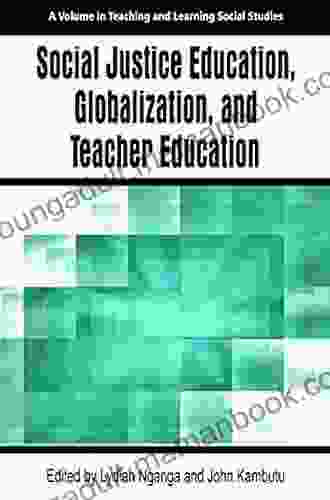Social Justice Education, Globalization, and Teacher Education in the 21st Century

In the 21st century, the world is more interconnected than ever before. Globalization has brought people from different cultures and backgrounds together, creating both opportunities and challenges for educators. One of the most important challenges facing educators today is how to prepare students to live and work in a globalized world.
4 out of 5
| Language | : | English |
| File size | : | 1776 KB |
| Text-to-Speech | : | Enabled |
| Enhanced typesetting | : | Enabled |
| Print length | : | 118 pages |
| Screen Reader | : | Supported |
| X-Ray for textbooks | : | Enabled |
| Hardcover | : | 328 pages |
| Item Weight | : | 1.4 pounds |
| Dimensions | : | 6.14 x 0.75 x 9.21 inches |
Social justice education is an essential part of preparing students for a globalized world. Social justice education teaches students about the root causes of inequality and oppression, and it empowers them to take action to create a more just and equitable world. By providing students with a critical understanding of the world, social justice education prepares them to be active and engaged citizens who can make a difference in their communities and the world.
The Role of Teachers in Fostering Social Justice
Teachers play a vital role in fostering social justice in a globalized world. They can help students to understand the root causes of inequality and oppression, and they can empower students to take action to create a more just and equitable world.
Here are some of the ways that teachers can foster social justice in their classrooms:
- Create a safe and welcoming environment for all students. All students deserve to feel safe and welcome in their classrooms, regardless of their race, ethnicity, religion, gender, sexual orientation, or disability. Teachers can create a safe and welcoming environment by establishing clear rules and expectations, by being respectful of all students, and by valuing diversity.
- Teach students about the root causes of inequality and oppression. Students need to understand the root causes of inequality and oppression in order to be able to take action to create a more just and equitable world. Teachers can teach students about these root causes through their lessons, through guest speakers, and through field trips.
- Empower students to take action. Once students understand the root causes of inequality and oppression, they need to be empowered to take action to create a more just and equitable world. Teachers can empower students by providing them with opportunities to speak out against injustice, to organize for change, and to participate in community service.
The Need for Teacher Education Programs to Prepare Future Teachers to Address the Challenges and Opportunities Presented by Globalization
Teacher education programs need to prepare future teachers to address the challenges and opportunities presented by globalization. This means providing future teachers with the knowledge, skills, and dispositions they need to foster social justice in their classrooms.
Here are some of the things that teacher education programs can do to prepare future teachers to address the challenges and opportunities presented by globalization:
- Incorporate social justice education into the curriculum. Social justice education should be a central part of teacher education programs. Future teachers need to learn about the root causes of inequality and oppression, and they need to be empowered to take action to create a more just and equitable world.
- Provide future teachers with opportunities to work with diverse students. Future teachers need to have experience working with students from different cultures and backgrounds. This experience will help them to develop the skills and dispositions they need to create a safe and welcoming environment for all students.
- Prepare future teachers to teach about globalization. Future teachers need to be able to teach students about globalization in a way that is both engaging and relevant. They need to be able to help students understand the root causes of globalization, the impact of globalization on different cultures and communities, and the opportunities and challenges that globalization presents for individuals and societies.
Social justice education is an essential part of preparing students for a globalized world. By providing students with a critical understanding of the world, social justice education prepares them to be active and engaged citizens who can make a difference in their communities and the world.
Teachers play a vital role in fostering social justice in a globalized world. They can help students to understand the root causes of inequality and oppression, and they can empower students to take action to create a more just and equitable world.
Teacher education programs need to prepare future teachers to address the challenges and opportunities presented by globalization. This means providing future teachers with the knowledge, skills, and dispositions they need to foster social justice in their classrooms.
4 out of 5
| Language | : | English |
| File size | : | 1776 KB |
| Text-to-Speech | : | Enabled |
| Enhanced typesetting | : | Enabled |
| Print length | : | 118 pages |
| Screen Reader | : | Supported |
| X-Ray for textbooks | : | Enabled |
| Hardcover | : | 328 pages |
| Item Weight | : | 1.4 pounds |
| Dimensions | : | 6.14 x 0.75 x 9.21 inches |
Do you want to contribute by writing guest posts on this blog?
Please contact us and send us a resume of previous articles that you have written.
 Top Book
Top Book Novel
Novel Fiction
Fiction Nonfiction
Nonfiction Literature
Literature Paperback
Paperback Hardcover
Hardcover E-book
E-book Audiobook
Audiobook Bestseller
Bestseller Classic
Classic Mystery
Mystery Thriller
Thriller Romance
Romance Fantasy
Fantasy Science Fiction
Science Fiction Biography
Biography Memoir
Memoir Autobiography
Autobiography Poetry
Poetry Drama
Drama Historical Fiction
Historical Fiction Self-help
Self-help Young Adult
Young Adult Childrens Books
Childrens Books Graphic Novel
Graphic Novel Anthology
Anthology Series
Series Encyclopedia
Encyclopedia Reference
Reference Guidebook
Guidebook Textbook
Textbook Workbook
Workbook Journal
Journal Diary
Diary Manuscript
Manuscript Folio
Folio Pulp Fiction
Pulp Fiction Short Stories
Short Stories Fairy Tales
Fairy Tales Fables
Fables Mythology
Mythology Philosophy
Philosophy Religion
Religion Spirituality
Spirituality Essays
Essays Critique
Critique Commentary
Commentary Glossary
Glossary Bibliography
Bibliography Index
Index Table of Contents
Table of Contents Preface
Preface Introduction
Introduction Foreword
Foreword Afterword
Afterword Appendices
Appendices Annotations
Annotations Footnotes
Footnotes Epilogue
Epilogue Prologue
Prologue David E Mcnabb
David E Mcnabb Alyson Reid Larade
Alyson Reid Larade Ray Btad
Ray Btad Matthew Wright
Matthew Wright Craig Martelle
Craig Martelle Tom Lydon
Tom Lydon Susan Hayes
Susan Hayes Walter Jon Williams
Walter Jon Williams Sam Tranum
Sam Tranum David Graeber
David Graeber Jonathan Bell
Jonathan Bell Kindle Edition
Kindle Edition Lin Poyer
Lin Poyer Naren Weiss
Naren Weiss Michael Farrell
Michael Farrell Stephen Samuel Smith
Stephen Samuel Smith Ruchi Agarwal Rangnath
Ruchi Agarwal Rangnath Cheyenne Mccray
Cheyenne Mccray Catherine Sophian
Catherine Sophian R Bruce Hoadley
R Bruce Hoadley
Light bulbAdvertise smarter! Our strategic ad space ensures maximum exposure. Reserve your spot today!

 Herb SimmonsHow to Remedy Sore Throat and Feel Better Fast: Sore Throat Medicine Remedies
Herb SimmonsHow to Remedy Sore Throat and Feel Better Fast: Sore Throat Medicine Remedies Robbie CarterFollow ·11.9k
Robbie CarterFollow ·11.9k Blake BellFollow ·17.1k
Blake BellFollow ·17.1k Kevin TurnerFollow ·13.2k
Kevin TurnerFollow ·13.2k Floyd RichardsonFollow ·19k
Floyd RichardsonFollow ·19k Octavio PazFollow ·19k
Octavio PazFollow ·19k Bret MitchellFollow ·7.2k
Bret MitchellFollow ·7.2k Heath PowellFollow ·13.4k
Heath PowellFollow ·13.4k Fred FosterFollow ·15.8k
Fred FosterFollow ·15.8k

 Yukio Mishima
Yukio MishimaUnveiling the Zimmermann Telegram: A Pivotal Document in...
The Zimmermann Telegram, a diplomatic...

 George Martin
George MartinFearful Stories and Vile Pictures to Instruct Good Little...
In the annals of children's literature, few...

 Grant Hayes
Grant HayesJessica the Viscount Wallflower: A Tale of Transformation...
In the opulent ballrooms and glittering...

 Jerome Blair
Jerome BlairThe Economics of the Global Defence Industry: A...
The global...

 Blake Kennedy
Blake KennedyBreath of Heron - A Window into the Poetic Depths of...
In the realm of...
4 out of 5
| Language | : | English |
| File size | : | 1776 KB |
| Text-to-Speech | : | Enabled |
| Enhanced typesetting | : | Enabled |
| Print length | : | 118 pages |
| Screen Reader | : | Supported |
| X-Ray for textbooks | : | Enabled |
| Hardcover | : | 328 pages |
| Item Weight | : | 1.4 pounds |
| Dimensions | : | 6.14 x 0.75 x 9.21 inches |












